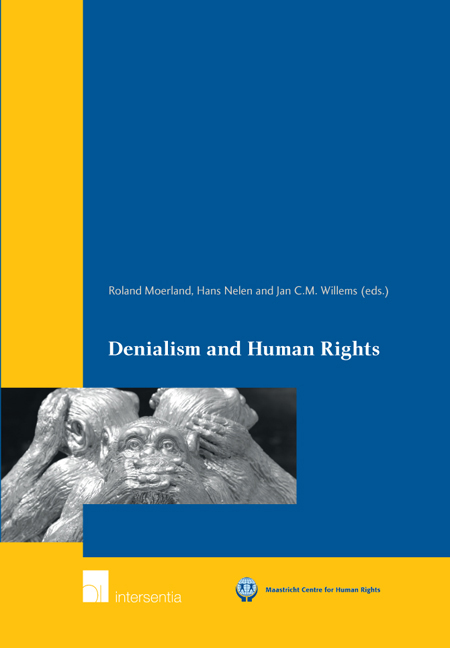Book contents
- Frontmatter
- Contents
- Acknowledgements
- Chapter I Introduction
- Chapter II Denialism and the Problem of Indifference
- Chapter III Denial and Acknowledgment in Public Responses to Information about Human Rights Violations
- PART I CHILDREN'S RIGHTS
- PART II GENOCIDE
- PART III (INTER)NATIONAL ORGANISATIONS
- PART IV NEW PENOLOGY
- PART V SOCIAL, ECONOMIC AND CULTURAL RIGHTS
- Chapter XVIII Poverty, Just World Thinking and Human Rights Law: A Study of the Relevance of Denial for Normative Legal Research
- Chapter XIX Genocide Denial and Refugees: A Lack of Protection in International Law?
- Chapter XX Climate Justice: Climate Change and Human Rights
- Chapter XXI A State in Denial: The ‘Intentional’ Sexual Transmission of HIV in South Africa
- Chapter XXII Olympic Idealism and Human Rights Infringements: How Athletes Cope with an Uncomfortable Reality
- Chapter XXIII Denialism and Human Rights: an Afterword
- About the Authors
- Maastricht Series in Human Rights
Chapter XIX - Genocide Denial and Refugees: A Lack of Protection in International Law?
from PART V - SOCIAL, ECONOMIC AND CULTURAL RIGHTS
Published online by Cambridge University Press: 19 September 2018
- Frontmatter
- Contents
- Acknowledgements
- Chapter I Introduction
- Chapter II Denialism and the Problem of Indifference
- Chapter III Denial and Acknowledgment in Public Responses to Information about Human Rights Violations
- PART I CHILDREN'S RIGHTS
- PART II GENOCIDE
- PART III (INTER)NATIONAL ORGANISATIONS
- PART IV NEW PENOLOGY
- PART V SOCIAL, ECONOMIC AND CULTURAL RIGHTS
- Chapter XVIII Poverty, Just World Thinking and Human Rights Law: A Study of the Relevance of Denial for Normative Legal Research
- Chapter XIX Genocide Denial and Refugees: A Lack of Protection in International Law?
- Chapter XX Climate Justice: Climate Change and Human Rights
- Chapter XXI A State in Denial: The ‘Intentional’ Sexual Transmission of HIV in South Africa
- Chapter XXII Olympic Idealism and Human Rights Infringements: How Athletes Cope with an Uncomfortable Reality
- Chapter XXIII Denialism and Human Rights: an Afterword
- About the Authors
- Maastricht Series in Human Rights
Summary
INTRODUCTION
Raphael Lemkin, the legal scholar who coined the word ‘genocide’, was a refugee from Poland. ‘Lemkin understood that people deemed him biased because he himself was a refugee.’ In Axis Rule, Lemkin wrote: ‘information and reports which slip out from behind the frontiers of occupied countries are very often labeled as untrustworthy atrocity stories because they are so gruesome that people simply refuse to believe them.’ Despite these hurdles, Lemkin led the fight for the international community to recognise genocide and adopt a legal regime to prevent the crime of genocide. It may not be apparent, but the voices of refugees have played a critical role in how the international community understands genocide.
There are two prominent Conventions which can impact a person who flees genocide: the Convention on the Prevention and Punishment of Genocide and the 1951 Refugee Convention. These two Conventions, which are the focus of this paper, are not intertwined and appear to have little to offer the refugee that flees genocide. As Professor Jonassohn astutely observed, ‘[s]cholarly attempts to understand the causes of genocide, the appearance of famines, and the generating of flows of refugees have been seriously hampered by overspecialization.’ The study of refugee movements during genocide normally would be considered an anthropological study. Anthropologists generally discuss the impact of genocide on people, their collective memory, and the ‘representations of a violent past structured by one's positioning as a survivor, perpetrator, journalist, or ethnographer.’ Unfortunately, given the rule of law's bumbling presence with regard to refugees and the empty political promises made by national leaders, the international legal community needs to revisit what further protections a refugee who flees genocide ought to be given, and needs to address this in a holistic manner.
This, of course, is no easy task and juxtaposing the two Conventions presents challenges. Adding to these challenges is genocide denial, simply defined as an attempt to minimise or deny statements of the scale and severity of genocide, which is a subtle and sometimes overt problem when there is a discussion on any aspect of genocide. I argue that the current framework in the status quo allows for genocide denial to manifest itself in many ways, some of which may not be obvious to those engaged in refugee protection.
- Type
- Chapter
- Information
- Denialism and Human Rights , pp. 387 - 402Publisher: IntersentiaPrint publication year: 2016

